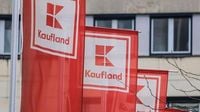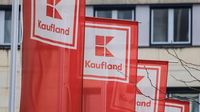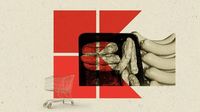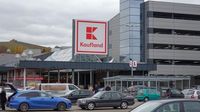Kaufland, one of Germany's largest supermarket chains, is facing serious scrutiny following a damning investigation by the "Team Wallraff" program aired on RTL and published by the magazine Stern. The investigation uncovered severe hygiene violations in 48 out of 50 stores examined, including mouse droppings, expired products, and mold. Journalists conducted undercover operations, posing as sales staff, and collected samples that were later tested in laboratories. The results revealed alarming deficiencies that could jeopardize customer and employee health.
The Munich Kreisverwaltungsreferat (KVR) conducts regular inspections of Kaufland branches every 12 to 18 months. According to KVR, inspections of the affected branches in Munich had already taken place in 2025, and while some deficiencies were noted, they were not deemed serious and were promptly addressed. Kaufland stated that customer complaints since 2023 have been minimal, with figures remaining in the single digits across all Munich locations.
According to the investigative report, the presence of green-black mold was a common sight in many Kaufland stores, particularly on drip grids in refrigerated sections. Moldy products were found in fresh food counters, affecting a staggering 80 percent of the examined stores. Additionally, the report indicated that chicken products were particularly concerning, with the pathogen Campylobacter detected in 15 out of 30 samples tested. This bacterium can cause severe gastrointestinal issues, including diarrhea, abdominal cramps, and fever, lasting over a week.
In response to the findings, Kaufland's spokesperson emphasized that the company prioritizes freshness and quality in its products. However, the report detailed further alarming practices, such as mixing old shrimp with fresh ones and the discovery of mouse droppings in bread baskets in one branch. Kaufland announced plans to investigate the shelf life issues and modernize the affected store.
In light of the report, Kaufland has taken immediate action, including the replacement of management in two stores—one in Bad Tölz and another in Homburg—where the undercover investigation took place. The company admitted to a "pest infestation" in Homburg, where hidden cameras captured mouse activity. Jochen Kratz, Kaufland's CEO, expressed deep concern over the images released and stated that they do not reflect the company's standards for food safety and cleanliness.
In a bid to restore consumer confidence, Kaufland has introduced a comprehensive five-point plan that includes significant investments of 500 million euros annually in new refrigeration equipment. The company also plans to conduct thorough cleanings across all its locations in Germany and employ external experts for quality assurance. The affected branch in Homburg will undergo a complete renovation and will be closed for six months, while the Bad Tölz store will close for one week to implement necessary hygiene measures.
Furthermore, Kaufland has been criticized by the Verdi union, which argues that simply changing management will not resolve the fundamental issues at play. Union representatives claim that the pressure on employees to maintain stock levels while managing unsold goods contributes to a toxic work environment, where employees fear repercussions for voicing concerns.
The investigation has sparked broader discussions about the working conditions at Kaufland. Employees have reportedly expressed relief that the issues have finally been brought to light, stating, "This is a liberation." Many have been uncomfortable selling moldy products and have repeatedly raised concerns with management, hoping that the public outcry will lead to meaningful changes.
As part of the response to the investigation, Kaufland is also increasing training for employees on hygiene and food safety practices. The company aims to ensure that all staff members are equipped with the knowledge necessary to uphold high standards in food handling.
Despite these efforts, the ongoing scrutiny has raised questions about the supermarket chain's commitment to maintaining a safe shopping environment. Kaufland, which operates over 770 stores and employs more than 90,000 people in Germany, is under pressure to demonstrate its dedication to food safety and employee welfare.
The revelations from "Team Wallraff" have not only impacted Kaufland's reputation but have also prompted calls for better regulations and oversight in the supermarket industry. As the company navigates this crisis, customers and employees alike are watching closely to see if Kaufland can effectively implement the necessary changes to restore trust and ensure safety in its stores.
In summary, Kaufland's hygiene scandal has unveiled significant shortcomings within the supermarket chain, prompting immediate managerial changes and a comprehensive response plan. While the company has taken steps to address the issues, the effectiveness of these measures remains to be seen, as customers and employees demand accountability and improved standards in food safety.






